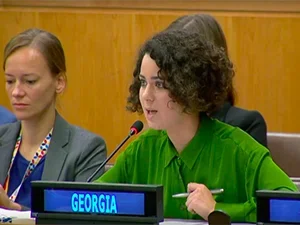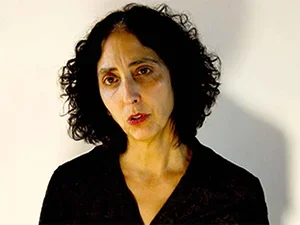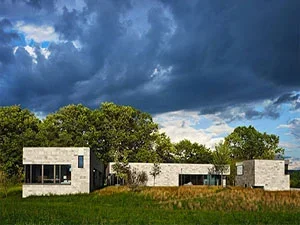CAPA: Related Content

With the recent global pandemic and Vermont's stay-at-home order, local farmers are responding to public health and food security concerns through new measures to protect customers and create more resilient communities.

Bennington College’s Prison Education Initiative (PEI) has been awarded a grant of $50,000 from the Ford Foundation.

Bennington College has received accreditation from the New England Commissions of Higher Education (NECHE) to award a Bennington College Associate of Art degree to incarcerated students through its Prison Education Initiative (PEI).

Bennington College has been awarded a four-year $290,000 grant from the New York-based The Endeavor Foundation to launch The Endeavor Foundation Environmental Changemaker Fellowship Program, which includes funded internships for Bennington students to work in nonprofits with a focus on environmental justice.

Bennington College has awarded three grants of $5,000 each to implement and support community-proposed initiatives that explore and expand food systems in Bennington county.

Students in Judith Enck's Plastic Pollution and What Students Can Do About It course have written letters to the editor about the need to protect the environment and marine life from the growing problem of plastic pollution.

Bennington College plans to provide free lunch to local children for three weeks this August, in an effort to bridge the gap between summer and school-year meal programs, reports the Bennington Banner.

The Center for the Advancement of Public Action (CAPA) at Bennington College is pleased to announce the 2019-20 candidates for its two-year Master of Fine Arts in Public Action degree.

Bennington College has been awarded a grant of $1 million from the Andrew W. Mellon Foundation to launch a three-year collaborative effort with local partners to address the systemic causes of food insecurity in Bennington County.

Senior fellow and visiting faculty member Judith Enck shared her tips for going green this holiday season.

The Nation interviewed faculty member John Hultgren for an article exploring the links, both historical and contemporary, between nationalism and environmentalism.

Students in Judith Enck's Plastic Pollution: What Can We Do About It? course have written letters to the editor about the need to protect the environment and marine life from the growing problem of plastic pollution.

Bennington College announced today that former Environmental Protection Agency Regional Administrator Judith Enck is launching a project, Beyond Plastics, that will work with college students and community leaders around the country to reduce plastic pollution.

Bronwyn Edwards ’19 initially entered Bennington intending to study literature and pursue publishing. As her time at the College evolved, she discovered a love for theatre and used her Field Work Terms (FWT) and internships to delve into experiences at Primary Stages, New York Public Radio, the New York State Council for the Arts, and more.

Visiting faculty member Judith Enck was quoted in The Guardian's investigation into the removal of the EPA's climate change section.

In preparation for the United States midterm elections on Tuesday, November 6, Bennington students, staff, and faculty have been collaborating on voter education and registration programs, encouraging college students and beyond to participate in the democratic process.

During visiting faculty member Judith Enck's presentation, "Turning Our Oceans into Landfills: The Growing Problem of Plastic Pollution," Enck, a former EPA regional administrator, encouraged students to work locally to enact change around single-use plastics.

Visiting faculty member and former EPA regional administrator Judith Enck weighed in on CBS News about the sudden leave of EPA children's health official Dr. Ruth Etzel.

As Georgia’s Youth Delegate to the United Nations, Bennington student Lika Torikashvili addressed the Third Committee of the 73rd Session of the United Nations General Assembly. In her speech, Torikashvili championed the 2030 Agenda for Sustainable Development.

Starting this fall, Bennington College will participate in a four-college consortium focusing on the global refugee crisis, supported by a $2.5-million grant from The Andrew W. Mellon Foundation.

The College is pleased to announce a new two-year Master of Fine Arts in Public Action degree, launching in Fall 2018.

A new initiative to bring cutting-edge computer science training to incarcerated and formerly incarcerated individuals in New York and Vermont has been awarded a $300,000 National Science Foundation grant.

Susan Sgorbati, director of the Center for the Advancement of Public Action (CAPA), sat down with Nam Phuong Thi Doan '18 for a Q & A interview about her work.

The survey, which was distributed by the College and completed by 443 people in Hoosick Falls and Petersburgh, NY, and Bennington VT, investigated cases of cancer and other illness tied to the presence of PFOA in drinking water.

Associate Director of Center for the Advancement of Public Action (CAPA) and faculty member David Bond was interviewed by Spectrum News regarding the findings of the College's most recent PFOA study.

Hundreds of residents gathered in Exeter, NH, for a two-day summit on perfluorinated compounds like PFOA. Hosted by the EPA, this inaugural summit brought together impacted communities, state agencies, and EPA leaders to discuss the ongoing response to PFOA contamination in New England and beyond.

“I don’t normally teach people who are studying dance or music,” said human rights lawyer Andrea Galindo. “So although I’m not normally teaching only lawyers, because people working in human rights come from different backgrounds as well, this is a whole new level.”

Faculty member Rabbi Michael M. Cohen discusses the recent diplomacy summit of experts from Afghanistan and Pakistan at the Peace Centre at Dawson College in Montreal.

On April 12, Bennington College participated in Middle School Access Day, an event designed to give local middle school students a preview of college opportunities.
